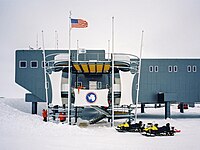
Photo from wikipedia
The B-mode polarization power spectrum in the cosmic microwave background (CMB) is about four orders of magnitude fainter than the CMB temperature power spectrum. Any instrumental imperfections that couple temperature… Click to show full abstract
The B-mode polarization power spectrum in the cosmic microwave background (CMB) is about four orders of magnitude fainter than the CMB temperature power spectrum. Any instrumental imperfections that couple temperature fluctuations to B-mode polarization must therefore be carefully controlled and/or removed. We investigate the role that a scan strategy can have in mitigating certain common systematics by averaging systematic errors down with many crossing angles. We present approximate analytic forms for the error on the recovered B-mode power spectrum that would result from differential gain, differential pointing and differential ellipticity for the case where two detector pairs are used in a polarization experiment. We use these analytic predictions to search the parameter space of common satellite scan strategies in order to identify those features of a scan strategy that have most impact in mitigating systematic effects. As an example, we go on to identify a scan strategy suitable for the CMB satellite proposed for the European Space Agency M5 call, considering the practical considerations of fuel requirement, data rate and the relative orientation of the telescope to the earth. Having chosen a scan strategy we then go on to investigate the suitability of the scan strategy.
Journal Title: Monthly Notices of the Royal Astronomical Society
Year Published: 2017
Link to full text (if available)
Share on Social Media: Sign Up to like & get
recommendations!